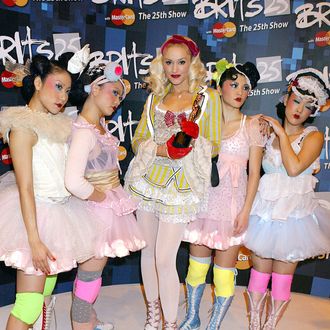
If you were of conscious mind in the mid-aughts, you might remember when Gwen Stefani was utterly obsessed with Japanese culture. So much, in fact, that she enlisted four “Harajuku girls” to be her backup dancers in music videos and on tour, while also accompanying her to various public appearances. The girls — four dancers named Jennifer Kita, Rino Nakasone, Mayuko Kitayama, and Maya Chino — were also given nicknames after the title of Stefani’s album, and apparently contractually obligated to only speak Japanese in public. Stefani sang about them in her single, “Rich Girl,” (as pointed out by Vice in 2018): “I’d get me four Harajuku girls to (uh huh) / Inspire me and they’d come to my rescue / I’d dress them wicked, I’d give them names (yeah) / Love, angel, music, baby / Hurry up and come and save me.”
As this was 2004, the presence of a white woman using four Asian women as ornamental props didn’t cause much of an uproar. But some people noticed. Comedian Margaret Cho spoke out at the time, saying, “I want to like them, and I want to think they are great, but I am not sure if I can. I mean, racial stereotypes are really cute sometimes, and I don’t want to bum everyone out by pointing out the minstrel show.” Meanwhile, Mad TV parodied Stefani’s apparent Asian fascination in a musical skit. But the real backlash against Stefani didn’t come until years later.
Usually celebrities will admit remorse for any questionable “artistic choices.” Does Stefani? Not really. In an interview with Billboard for the album’s 15th anniversary, she said that it was “an artistic and literal bow down to a culture that I was a superfan of,” and that the thought of doing a dance record was far from the scope of her reality, so the whole thing was sort of based on a fantasy: “When the Harajuku girls came out, it was like, you’re not even real, you’re a dream. It wasn’t like, ‘You’re not real because you’re Asian.’ Are you kidding me? That would be horrifying!”
Stefani went on to say that she had talked about the “Harajuku girls” concept with the dancers, and had nicknamed each of them based on their personalities. “It was like we were creating a group together,” she said. One thing she did admit was that she gets “a little defensive” when people bring up the topic of cultural appropriation, of which she has been accused more than once. “If we didn’t allow each other to share our cultures, what would we be?” she said. “You take pride in your culture and have traditions, and then you share them for new things to be created.”

